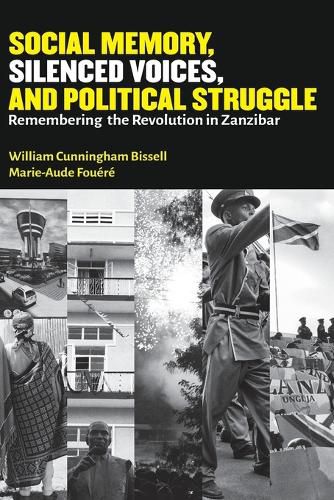Readings Newsletter
Become a Readings Member to make your shopping experience even easier.
Sign in or sign up for free!
You’re not far away from qualifying for FREE standard shipping within Australia
You’ve qualified for FREE standard shipping within Australia
The cart is loading…






This title is printed to order. This book may have been self-published. If so, we cannot guarantee the quality of the content. In the main most books will have gone through the editing process however some may not. We therefore suggest that you be aware of this before ordering this book. If in doubt check either the author or publisher’s details as we are unable to accept any returns unless they are faulty. Please contact us if you have any questions.
This volume focuses on the cultural memory and mediation of the 1964 Zanzibar revolution, analyzing it’s continuing reverberations in everyday life. The revolution constructed new conceptions of community and identity, race and cultural belonging, as well as instituting different ideals of nationhood, citizenship, sovereignty. As the commemoration of the 50th anniversary of the revolution revealed, the official versions of events have shifted significantly over time and the legacy of the uprising is still deeply contested. In these debates, the question of Zanzibari identity remains very much at stake: Who exactly belongs in the islands and what historical processes brought them there? What are the boundaries of the nation, and who can claim to be an essential part of this imagined and embodied community?
Political belonging and power are closely intertwined with these issues of identity and history–raising intense debates and divisions over precisely where Zanzibar should be situated within the national order of things in a postcolonial and interconnected world. Attending to narratives that have been overlooked, ignored, or relegated to the margins, the authors of these essays do not seek to simply define the revolution or to establish its ultimate meaning. Instead, they seek to explore the continuing echoes and traces of the revolution fifty years on, reflected in memories, media, and monuments. Inspired by interdisciplinary perspectives from anthropology, history, cultural studies, and geography, these essays foreground critical debates about the revolution, often conducted sotto voce and located well off the official stage–attending to long silenced questions, submerged doubts, rumors and secrets, or things that cannot be said.
$9.00 standard shipping within Australia
FREE standard shipping within Australia for orders over $100.00
Express & International shipping calculated at checkout
This title is printed to order. This book may have been self-published. If so, we cannot guarantee the quality of the content. In the main most books will have gone through the editing process however some may not. We therefore suggest that you be aware of this before ordering this book. If in doubt check either the author or publisher’s details as we are unable to accept any returns unless they are faulty. Please contact us if you have any questions.
This volume focuses on the cultural memory and mediation of the 1964 Zanzibar revolution, analyzing it’s continuing reverberations in everyday life. The revolution constructed new conceptions of community and identity, race and cultural belonging, as well as instituting different ideals of nationhood, citizenship, sovereignty. As the commemoration of the 50th anniversary of the revolution revealed, the official versions of events have shifted significantly over time and the legacy of the uprising is still deeply contested. In these debates, the question of Zanzibari identity remains very much at stake: Who exactly belongs in the islands and what historical processes brought them there? What are the boundaries of the nation, and who can claim to be an essential part of this imagined and embodied community?
Political belonging and power are closely intertwined with these issues of identity and history–raising intense debates and divisions over precisely where Zanzibar should be situated within the national order of things in a postcolonial and interconnected world. Attending to narratives that have been overlooked, ignored, or relegated to the margins, the authors of these essays do not seek to simply define the revolution or to establish its ultimate meaning. Instead, they seek to explore the continuing echoes and traces of the revolution fifty years on, reflected in memories, media, and monuments. Inspired by interdisciplinary perspectives from anthropology, history, cultural studies, and geography, these essays foreground critical debates about the revolution, often conducted sotto voce and located well off the official stage–attending to long silenced questions, submerged doubts, rumors and secrets, or things that cannot be said.